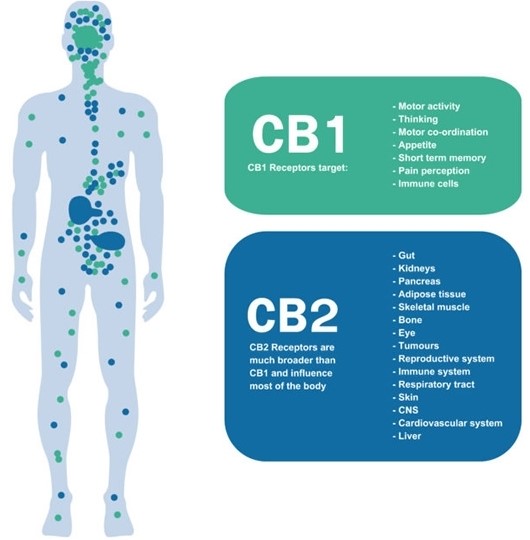The Endocannabinoid System (ECS) is a sophisticated network of receptors, enzymes, and endocannabinoids, which are cannabinoids produced by the body naturally. It is essential for preserving homeostasis, a condition of equilibrium and harmony inside the body. Several physiological systems, including mood, pain perception, appetite, sleep, immunological response, and stress are regulated by the ECS.
CB1 and CB2 receptors make up the majority of the receptors in the ECS. The central nervous system, which includes the brain and spinal cord, is the main location of CB1 receptors. These receptors are important for controlling memory, mood, emotions, and pain perception. Contrarily, CB2 receptors are mostly found in immune cells and the peripheral nervous system, where they help to control inflammatory and immunological responses.
Endogenous cannabinoids produced by the body are known as endocannabinoids. The two main endocannabinoids are 2-arachidonoylglycerol (2-AG) and anandamide (AEA). As neurotransmitters, they connect to and activate cannabinoid receptors to cause particular cellular reactions.

In order to maintain a balanced internal environment, the ECS functions as a homeostatic regulator, responding to both internal and external stimuli. The ECS is triggered, for instance, when the body experiences stress, harm, or inflammation, in order to reestablish balance and advance wellbeing.
The ECS’s significance increases when it comes to mental health. According to studies, the ECS is essential in controlling mood, anxiety, and stress reactions. It does this by controlling the release of neurotransmitters that have a significant impact on mental and emotional states, including serotonin, dopamine, and gamma-aminobutyric acid (GABA).
Various mental health conditions, such as anxiety, depression, and post-traumatic stress disorder (PTSD), have been related to dysregulation of the ECS. For instance, CB1 receptor expression may be altered in people with depression, and restoring ECS balance may assist to lessen depressed symptoms.
THC and CBD, two cannabinoid compounds from the cannabis plant, can bind to cannabinoid receptors and influence the ECS. The psychoactive component of cannabis, THC, binds largely to CB1 receptors, which causes intoxication and modifies mood and perception. However, CBD interacts with the ECS in a more complicated way, altering receptor activation and boosting the body’s own endocannabinoids. The “high” associated with THC is not produced by CBD, which is not intoxicating.
Significant interest in using cannabis as a medicinal substance for a variety of mental health issues has been spurred by the possible effects of cannabinoids on mental health. The effects of cannabinoids can vary significantly based on individual characteristics, dosage, and the particular mental health illness being treated, therefore it is imperative to approach this with prudence.
Additionally, research into the use of cannabinoids in the treatment of mental illness is also ongoing. While some studies, for instance, have shown encouraging results in reducing the signs and symptoms of anxiety and depression, others have drawn attention to potential hazards, particularly with the excessive use of cannabis high in THC.
The relationship between the ECS, cannabinoids, and mental health will probably become more clear as study goes on. This information will help in the creation of more specialized and focused cannabis-based treatments for mental health conditions.
Finally, it should be noted that the Endocannabinoid System is a crucial and complex biological system that is fundamentally responsible for controlling a variety of physiological functions, including mood and emotional reactions. Our understanding of how cannabinoids from cannabis may be used as possible therapeutic agents in the treatment of mental health issues must keep pace with the complex interactions between the ECS and mental health. As research advances, ethical and fact-based practices will open the door to utilizing cannabis’ full potential in mental health care while preserving the security and wellbeing of those seeking help from mental health issues.



